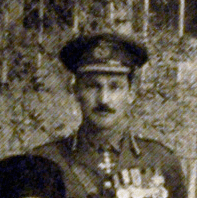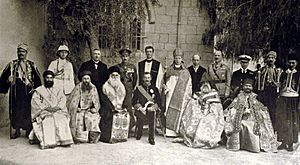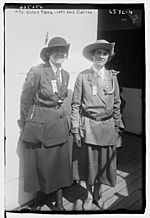Gilbert Clayton facts for kids
Quick facts for kids
Sir Gilbert Clayton
|
|
|---|---|

Sir Gilbert Clayton in Jerusalem, Palestine, 1922.
|
|
| Born | April 6, 1875 |
| Died | 11 September 1929 (aged 54) |
| Occupation | British Army intelligence officer and colonial administrator |
Sir Gilbert Falkingham Clayton (born April 6, 1875 – died September 11, 1929) was a British Army officer. He was also a colonial administrator. This means he helped manage lands that were under British control.
He worked in the Middle East in the early 1900s. During World War I, he was an intelligence officer in Egypt. He helped people who started the Arab Revolt. This revolt was against the Ottoman rulers. In the 1920s, he helped set up borders for new countries. These countries later became Israel, Jordan, Syria, Saudi Arabia, and Iraq.
Contents
Early Life and Army Career
Gilbert Clayton was born on April 6, 1875, in Ryde, on the Isle of Wight. He was the oldest son of William Lewis Nicholl Clayton.
He studied at the Royal Military Academy, Woolwich. In 1895, he became an officer in the Royal Artillery. He went to Sudan during the end of the Mahdist War. He fought in the Battle of Atbara in 1898. Later, he worked in Egypt. In 1910, he left the army. He became a private secretary for the Governor-General of Sudan, Sir Francis Reginald Wingate.
World War I Role
During World War I, Clayton worked in army intelligence in Cairo, Egypt. He was part of the new Arab Bureau. In 1914, he sent a secret message to Lord Kitchener. He suggested that Britain should work with Arab groups. The goal was to help them overthrow their Ottoman rulers.
He became the Director of Intelligence. He was promoted to Brigadier-General. In this job, he worked with many people. These people helped start the Arab Revolt against the Ottoman Turks.
T. E. Lawrence, a famous British officer, wrote about Clayton. Lawrence said Clayton was a great leader. He was calm and clear-sighted. He let his team work freely. Lawrence described Clayton's influence as quiet but strong. He was like "water, or permeating oil, creeping silently and insistently through everything."
Working as an Administrator
After the war, Clayton advised the Egyptian government. Then he worked in the British administration of Mandatory Palestine. This was a territory managed by Britain.
He was the Civil Secretary of Palestine from 1922 to 1925. For a short time, he was the acting High Commissioner. He then helped with talks for the Treaty of Jeddah (1927). He was sent to meet with Sultan Ibn Saud of Nejd. He also went to Yemen to talk with its ruler, Imam Yahya Muhammad Hamid ed-Din.
From 1928, he was the High Commissioner for the British Mandate of Mesopotamia (Iraq). Clayton was involved in talks for a new treaty between Britain and Iraq. He died suddenly from a heart attack. This delayed the treaty, but it was signed in 1930.
Family Life
Gilbert Clayton's younger brother, Iltyd Nicholl Clayton, was also a British Army officer.
In 1912, Gilbert married Enid Caroline Thorowgood in London. They had five children. The family traveled with him to his different jobs. Sadly, two of their children died. One died from pneumonic plague.
His daughter Patience later became a magistrate. She helped young offenders. She received an OBE award for her work. His son John became a doctor. He was the doctor for Eton College. He also treated the Queen Mother in 1982. Another son, Sam, married Lady Mary Leveson-Gower. She was the Queen Mother's sister's daughter. Their daughter is Rosie Stancer, a polar explorer.
Gilbert Clayton died on September 11, 1929, in Baghdad. He was 54 years old. His wife and their three remaining children moved back to England.
Important Jobs Held
Clayton held many important positions:
- 1914–1916 – Director of Military Intelligence, British Army Headquarters, Cairo
- 1916–1917 – Brigadier General, General Staff, Military Operations, Hejaz
- 1917–1919 – Chief Political Officer, Egyptian Expeditionary Force. Military Governor, Palestine
- 1919–1922 – Adviser to the Egyptian Ministry of the Interior
- 1922–1925 – Civil Secretary to the Palestine Government
- 1925–1925 – Acting British High Commissioner for Palestine
- 1925–1928 – Envoy to the Sultan Ibn Saud of Nejd
- 1926 – Special Envoy to Yahya ibn Muhammad Hamid ad-Din, Imam of the Yemen
- 1927 – Special Envoy to Rome
- 1929 – British High Commissioner to the Kingdom of Iraq
Awards and Honours
Gilbert Clayton received several awards for his service:
- 1914 – Third Class of the Imperial Ottoman Order of the Medjidieh
- 1915 – Companion of the Order of St. Michael and St. George
- 1916 – Officer of the Legion of Honour
- 1917 – Companion of the Order of the Bath
- 1917 – Order of St. Stanislas, 2nd Class
- 1919 – Knight Commander of the Order of the British Empire
- 1926 – Knight Commander of the Order of St. Michael and St. George
 | Mary Eliza Mahoney |
 | Susie King Taylor |
 | Ida Gray |
 | Eliza Ann Grier |



